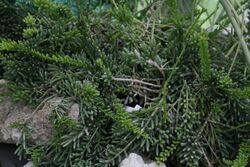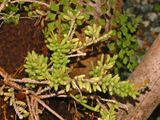Biology:Rhipsalis mesembryanthemoides
| Rhipsalis mesembryanthemoides | |
|---|---|

| |
| Rhipsalis mesembryanthemoides | |
| Scientific classification | |
| Kingdom: | Plantae |
| Clade: | Tracheophytes |
| Clade: | Angiosperms |
| Clade: | Eudicots |
| Order: | Caryophyllales |
| Family: | Cactaceae |
| Subfamily: | Cactoideae |
| Genus: | Rhipsalis |
| Species: | R. mesembryanthemoides
|
| Binomial name | |
| Rhipsalis mesembryanthemoides Haw.
| |
| Synonyms | |
| |
Rhipsalis mesembryanthemoides is a cactus in the genus Rhipsalis of the family Cactaceae. The first description was in 1821 by Adrian Hardy Haworth. The shoots are reminiscent of the plants of the genus Mesembryanthemum, hence the epithet mesembryanthemoides.
Description
Rhipsalis mesembryanthemoides is an epiphytic plant with strong stems covered by tiny branchlets. Initially this plant grows erect; later it is pendent. The main branches are elongated, cylindrical and woody, 10 to 20 inches long and 1 to 2 millimeters in diameter. The white flowers appear at areoles of the branchlets. They are 8 millimeters long and reach a diameter of 15 millimeters. The short-oblong fruits are white, about 5 millimeters long.
Distribution
This species is widespread in the Brazilian state of Rio de Janeiro, on both sides of the Baía da Guanabara, at an altitude below 600 metres (2,000 ft) above sea level..
Gallery
References
- ↑ Taylor, N.P.; Zappi, D. (2013). "Rhipsalis mesembryanthemoides". The IUCN Red List of Threatened Species (IUCN) 2013: e.T152443A637316. doi:10.2305/IUCN.UK.2013-1.RLTS.T152443A637316.en. http://www.iucnredlist.org/details/152443/0. Retrieved 11 January 2018. Database entry includes justification for why this species is critically endangered.
- Hunt D.R. et al. (2006): The new cactus lexikon. DH Books, Miborn Port, England. ISBN:0-9538134-5-2
- Anderson H.F. et al. (2001): The cactus family. Timber Press, Portland, Oregon, USA. ISBN:0-8819249-8-9
- Rhipsalis.com
- Cacti Guide
- Desert-tropical
Wikidata ☰ Q255770 entry
 |





